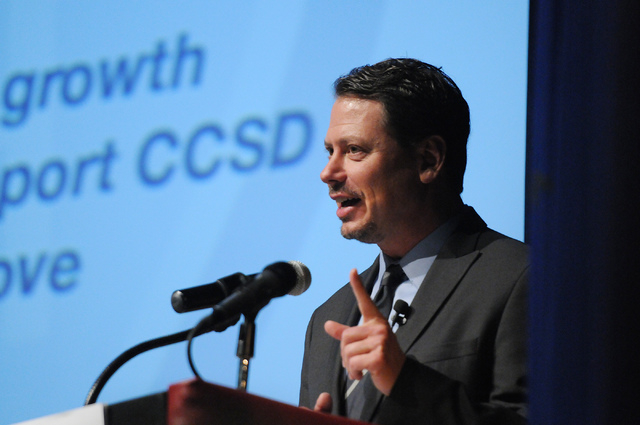Clark County school superintendent’s budget scrutiny upsets status quo

Some people are waking up today with indigestion courtesy of Clark County School District Superintendent Pat Skorkowsky. And that’s a good thing.
In his State of the District Address on Monday at Del Sol High School, Skorkowsky promised to squeeze and scrutinize every dollar that comes into America’s fifth-largest public school system. With a $2 billion annual budget, that’s a lot of oversight.
Such talk from Skorkowsky makes for good sound bites at a time many local taxpayers and business owners are still recovering from the recession and aren’t in the mood for paying higher taxes. It also adds to the superintendent’s greater credibility — as long as he follows through and we see the results of the increased fiscal focus.
What’s in it for you: For starters, increased confidence that your tax dollars for public education are being spent more effectively while simultaneously producing better results in the classroom.
What’s in it for teachers and administrators: Potentially, more funds from the same limited pool to apply to programs that show results, or at least real promise anecdotally. What a relief for dedicated teachers to know someone is actually questioning some of the tried-and-untrue programs, procedures and even texts they’ve been mandated to use in the classroom.
What’s in it for Skorkowsky: Call it speculation, but perhaps kind of political gravity it will take to make a powerful case in the future for focused increases in funding for a gigantic school district faced with complex challenges ranging from overcrowded classrooms to burgeoning English Language Learner students.
Finally, what’s in it for lovers of the status quo: the threat of substantial change. That’s where the indigestion comes in.
Those who believe Nevada doesn’t invest enough in the education of its children and young people can make a strong argument. But it’s also true that for a long time the booming Clark County district had the reputation of being long on growth and short on scrutinizing the efficiency of the spending. The quality of education, as measured by graduation rates, remained lackluster while the district grew to into a bureaucratic behemoth.
Growth was good for a lot of people — including those who had business and vending connections with the district. With a $2 billion annual budget, lucrative contracts were plentiful. But school district skeptics such as myself have long wondered how effective — and how supervised — all that spending has been. Maybe now we’ll see.
For his part, Skorkowsky has spent the past 26 years coming up through the district’s ranks, from teacher to top administrator. He clearly understands the system, what its influences are, but also what’s at stake in the long run for teachers and students. (It is about the students, isn’t it?)
So when Skorkowsky offers a solemn promise to take a hard look at the big numbers, it’s bound to make pulses pound down at Business-As-Usual headquarters.
While he’s busy working to increase student proficiency, improve academic growth, close achievement gaps, shape up college and career preparedness, encouraging family and community involvement, and respecting the need for staff diversity, he’s also focusing on ensuring the “return on investment” of programs and practices rises as well.
Part of the district’s new “Pledge of Achievement” reads, “Our students must achieve more. Our community must achieve more. We must do this as a community with unity and a sense of purpose — a recognition that we are all in this together, and we all have a stake in the outcome.” Those cynical of public education’s ability to stand and deliver for students will scoff at such an optimistic vision.
But increasing fiscal efficiency while raising proficiency won’t come easily. Substantive change never does.
And if some formerly comfortable folks have to start drinking Pepto straight from the bottle to control their stomach upset, well, call it a sign of progress.
John L. Smith’s column appears Sunday, Tuesday, Wednesday, Thursday and Friday. E-mail him at jsmith@reviewjournal.com or call (702) 383-0295.












